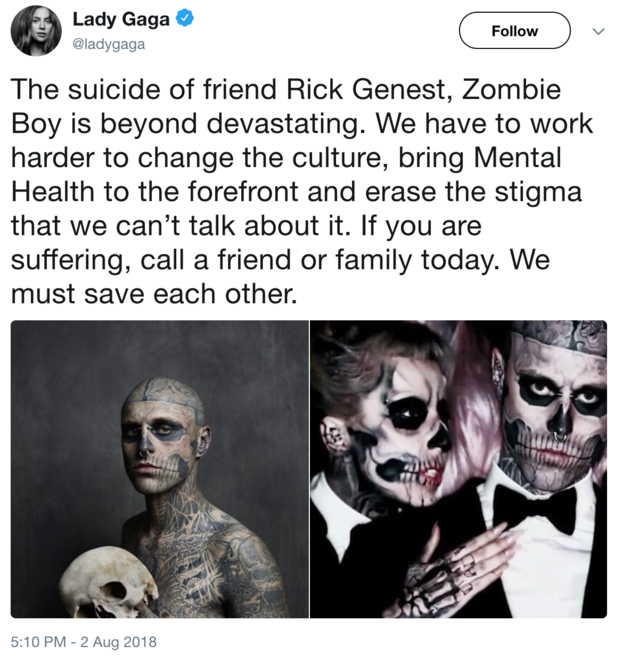Health
Reflecting on Rick Genest: Body Art and Mental Health
Rick Genest's unfortunate passing highlights the continued need to fight stigma.
Posted August 3, 2018
According to Montreal Police sources, model, entertainer, and cultural icon Rick Genest, died by suicide on Wednesday, August 1, 2018. Also known as Zombie Boy, Genest was discovered by Nicola Formichetti and became famous for his eye-catching head-to-toe body art. His unique look earned two Guinness World Records and collaborations with Thierry Mugler, Jay-Z, and Lady Gaga. Although little is documented about Rick Genest's mental health history, his unfortunate passing may teach us about stigma, body art, and mental health.
Genest claimed to be fascinated by body art since the age of 5. At the age of 15, Genest was diagnosed with a brain tumor. He was informed of the severe risks of removal, and the likelihood that he would be disfigured. In the six months approaching the surgery, Genest contemplated about life, death, and re-evaluated how he wanted to live his life.
Genest shared, "I guess this spiralled me into becoming obsessed with the morbid and macabre. As it happened, the operation to remove the tumour went without a hitch, but since then, I’ve known life was too short to not fulfill my dreams of tattoos and body modifications."
The next year, Genest got his first tattoo, ran away from home, and began working in freak shows. He continued to expand his canvas, incorporating about 90 percent of his body and finishing with his iconic skull image by age 21. In an interview with Wonderland, Genest explained that his body art was a metaphor for runaway consumerism. He also shared that his art was inspired by his life experiences as was often, "out-casted, hated or misunderstood."
Tattoos and Mental Health
Tattoos have been used as a method of personal expression across several societies for over 5,000 years. According to a 2016 Harris poll, about 29 percent of Americans have at least one tattoo. Nevertheless, a cultural taboo still exists, and individuals who have visible tattoos are often stereotyped. Khosla, Verghese, and Gordon have noted that tattoos are more prevalent among people who suffer from mental health conditions. Further, links have also been drawn between tattoos and self-injury, and more specifically, suicide. Such associations can be used to paint a picture that perpetuates stigma. When it comes to mental health, we may also be missing the curative symbolism behind body art.
Tattoos are often used to express uniqueness. In a study by Body Image, tattoos as a method of self-expression helped to reduce anxiety body image and improved self-esteem. Tattoos are commonly motivated by an individual's desire to represent an important event, relationship, or interest. Mental health blogger, Liv, shares how her body art is symbolic of her mental health journey. Refusing to refer to her story as a struggle, Liv is an example of how tattoos can be used to represent triumphs in mental wellness.
Although little is known about Rick Genest's mental health history, his existential reflection following his brain tumor diagnosis may have been his source of inspiration for the metaphorical art depicted on his canvas. This piece is not intended to speculate about Rick Genest's mental health diagnoses, but to simply highlight the signs that we may fail to see due to stigma. Considering the nature of his passing, although shocking to those who knew him personally, it is likely that he was still experiencing continued difficulty pertaining to mental wellness. In the wake of his passing, Lady Gaga has shared a heartfelt tribute on Twitter highlighting the importance of mental health and suicide awareness. While the causes my be unknown, what we know for sure is that mental health stigma continues to serve as an obstacle for individuals who may need help.

Want to know more about how you can help?
Read: How you can contribute to suicide prevention
If you are experiencing suicidal thoughts please seek help.
Call the National Suicide Prevention Lifeline at 1-800-273-8255 or chat online.


